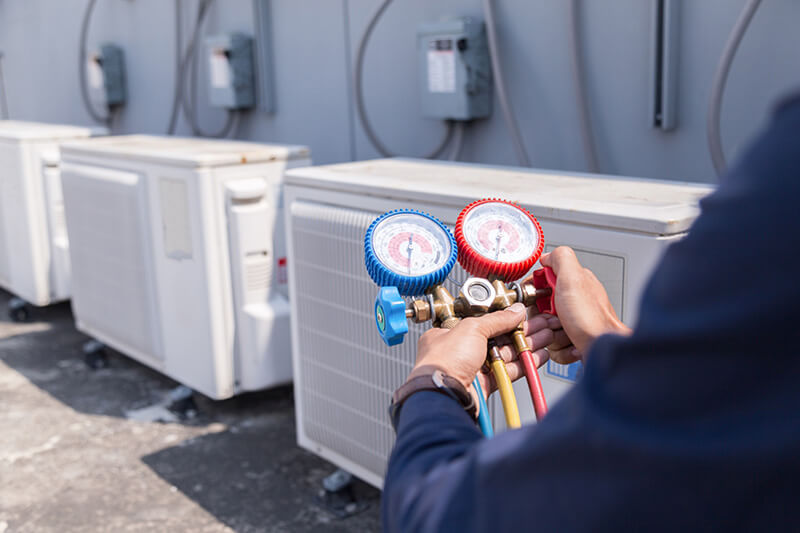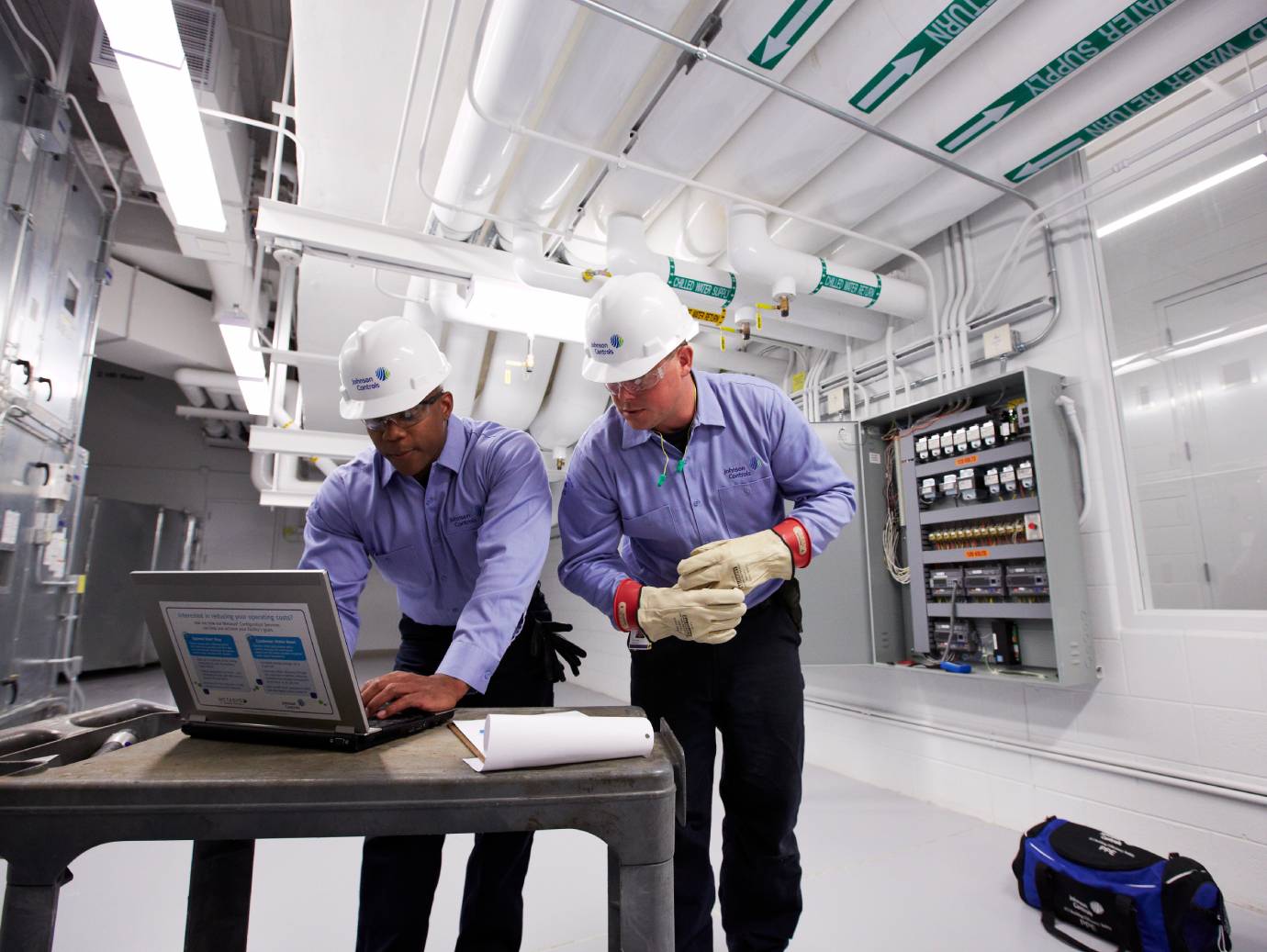Picking Between a Heatpump and Heating System: Key Factors To Consider for Your A/c Demands
When examining home heating options for a/c requires, the choice between a heatpump and a heating system can be complex. Each system offers distinct benefits tailored to particular environments and energy performance goals. Recognizing these differences is necessary for making an informed selection. Secret variables such as setup costs and ecological effect even more complicate the selection process. Which choice absolutely straightens with one's comfort and sustainability preferences? The complying with areas will discover these considerations carefully.
Understanding Warmth Pumps: Exactly How They Function and Their Benefits
While several homeowners take into consideration numerous home heating choices, recognizing just how warmth pumps feature and their benefits can significantly affect their decision. Warmth pumps operate by moving warmth instead than generating it. In the wintertime, they draw out warmth from the outside air or ground and transfer it indoors, while in the summer season, they reverse this procedure, cooling the home by removing warmth outside. This dual performance makes them flexible for year-round environment control.One of the primary advantages of warm pumps is their power efficiency. They use substantially less power contrasted to traditional heater, potentially resulting in reduced energy costs (heat pump service). Furthermore, warm pumps have a smaller carbon impact, making them an eco-friendly selection. They also require less maintenance than conventional systems, adding to lasting expense financial savings. On the whole, recognizing the technicians and advantages of heatpump can help home owners make informed decisions regarding their home heating and cooling down demands
Discovering Heaters: Types, Procedure, and Advantages
Furnaces can be found in numerous kinds, consisting of gas, electric, and oil versions, each with distinctive functional mechanisms. Understanding these differences is important, as they influence efficiency and home heating efficiency. Additionally, furnaces offer numerous benefits, such as regular warmth outcome and reliability in chillier climates.
Sorts of Heaters
Home heating systems can differ considerably in design and procedure, with furnaces being a preferred option among property owners. There are several kinds of heaters, each using different gas sources and technologies. Gas heating systems are common, leveraging natural gas to create warmth effectively. Electric heaters, on the various other hand, utilize electrical resistance to create heat, typically favored for their uncomplicated installment. Oil heaters, while less usual, work in areas with minimal gas gain access to (heat pump replacement ooltewah tn). Furthermore, condensing heaters make best use of energy effectiveness by reusing and recording exhaust gases. Each type operates with a system of warmth exchangers and ductwork to distribute warm air throughout a home. Understanding the differences between these heater kinds is essential for informed HVAC decisions
Benefits of Heating systems
For house owners looking for dependable heat throughout chilly months, the advantages of heating systems are considerable. Heaters give constant heating, ensuring even temperatures throughout the home. They are particularly efficient in severe cool, usually outshining warm pumps in frigid conditions. Various kinds, including gas, electrical, and oil furnaces, provide flexibility to meet varied requirements and preferences.Furnaces also often tend to have reduced preliminary setup costs compared to heatpump, making them an extra accessible alternative for numerous. Their robust layout adds to a much longer lifespan, with numerous devices lasting over 15 years with correct maintenance. Additionally, modern-day furnaces are often geared up with innovative innovation for enhanced effectiveness, which can result in decreased power costs. On the whole, heaters stay a reputable option for efficient home heating.

Power Performance: Comparing Warmth Pumps and Furnaces
When comparing energy efficiency in between heatpump and heating systems, the Seasonal Energy Performance Ratio (SEER) plays a crucial role in establishing efficiency. Furthermore, a functional price analysis reveals the long-lasting economic ramifications of each system. Comprehending these aspects can assist homeowners in making informed decisions concerning their heating solutions.
Seasonal Power Effectiveness Proportion
Energy efficiency plays a vital function in the decision-making process in between heatpump and furnaces, especially when thinking about the Seasonal Energy Efficiency Ratio (SEER) This statistics measures the cooling efficiency of heatpump over a whole cooling period, providing a standardized method to assess performance. Greater SEER rankings suggest greater energy efficiency, converting to lower energy usage and reduced utility expenses. In comparison, heating systems are generally examined utilizing the Yearly Gas Application Performance (AFUE) rating, which shows home heating efficiency. When contrasting these 2 systems, homeowners ought to prioritize SEER scores for heatpump, as they directly effect general power savings and ecological sustainability. An extensive understanding of SEER can notably affect the long-term fulfillment and cost-effectiveness of the chosen cooling and heating remedy.
Operational Price Evaluation
Understanding the operational costs linked with warm pumps and heating systems is crucial for homeowners evaluating their choices. Warmth pumps commonly offer higher power performance, converting electric energy right into warmth with marginal waste. This causes lower monthly energy costs, especially in modest environments. On the other hand, click here for more info conventional furnaces, specifically gas models, may have lower upfront expenses but can incur higher operational costs gradually due to sustain costs and performance ratings.Moreover, heatpump can operate as both heating and cooling down systems, possibly decreasing the need for different cooling and heating units. While preliminary financial investments for heatpump may be higher, their long-lasting cost savings in power performance can make them an extra cost-effective choice for numerous homes. Cautious analysis of local energy rates is important to figure out the most effective option.
Installment Expenses: What to Expect for each and every Heating Unit
Setup costs for furnace can differ significantly between heatpump and heaters, affecting house owners' choices. Heatpump typically have higher in advance installment costs, usually ranging from $3,500 to $8,000, relying on the system size and intricacy of setup. This includes the outside system, indoor handling system, and needed ductwork modifications. Conversely, heaters often tend to have reduced initial costs, balancing in between $2,500 and $6,000, which can be appealing for budget-conscious home owners. Installment costs can increase if substantial ductwork is required.Moreover, the option of fuel kind for heating systems-- natural gas, propane, or electric-- can likewise influence installment expenses. While warmth pumps provide energy efficiency, their first investment may hinder some purchasers. Ultimately, examining installation prices together with long-term cost savings and performance will certainly assist property owners in making notified decisions about their home heating systems.
Environment Considerations: Which System Carries Out Much Better in Your Location
Just how do climate problems influence the performance of home heating systems? The efficiency of warm pumps and heaters can differ significantly relying on the regional environment. In moderate environments, heatpump stand out by effectively transferring heat from the outside air, making them index an energy-saving option. Their efficiency diminishes in extremely cool temperatures, where they might struggle to remove enough heat. Conversely, heating systems, especially gas versions, give consistent and dependable heat no matter outside problems, making them more effective in colder regions.In areas that experience milder winters, warm pumps can run successfully year-round, providing both heating & cooling. In contrast, regions with rough winters often take advantage of the toughness of furnaces. Inevitably, comprehending the neighborhood climate is necessary when deciding between a heat pump and a furnace, as it straight impacts their operational efficiency and general efficiency.
Upkeep Needs: Long-Term Look After Warm Pumps vs. Furnaces
While both heat pumps and heating systems call for regular maintenance to guarantee peak efficiency, their certain needs and treatment regimens differ substantially. Furnaces normally require much less frequent focus, with annual assessments being adequate to examine for gas leaks, tidy filters, and analyze overall functionality. Their easier design often permits for simple repairs.In comparison, heatpump require biannual upkeep as a result of their double role in cooling and heating. This includes cleansing coils, checking cooling agent levels, and guaranteeing that both the indoor and outside devices function at their best. Additionally, heatpump maintenance frequently involves more intricate parts, making professional maintenance essential.Neglecting maintenance can result in reduced performance and raised power expenses for both systems. Eventually, home owners should consider these lasting treatment needs when selecting in between a heatpump and a heating system, as proactive maintenance can extend the lifespan and efficiency of either system substantially.
Environmental Impact: Picking a Sustainable Home Heating Alternative
The environmental influence of furnace is a critical examination for property owners seeking lasting options. Warmth pumps are usually more energy-efficient than standard furnaces, as they transfer warmth instead of create it, substantially decreasing carbon discharges. By utilizing renewable energy sources, such as geothermal or air-source heatpump, house owners can better reduce their eco-friendly footprint.On the various other hand, gas furnaces send out greenhouse gases and contribute to air contamination, though they commonly supply higher heat output. Innovations in technology have actually led to the growth of high-efficiency heating systems that lessen emissions.Ultimately, picking a heating system includes weighing effectiveness versus ecological impact. Property owners are encouraged to show on local power resources and motivations for eco-friendly systems, making sure a selection that straightens with both individual comfort and environmental duty. The decision affects not only prompt comfort but additionally long-lasting sustainability and environmental wellness.
Regularly Asked Concerns
The Length Of Time Do Warm Pumps and Furnaces Typically Last?
The life-span of warm pumps usually ranges from 15 to twenty years, while heaters can last between 15 to three decades. Routine maintenance significantly affects their long life and effectiveness in providing home heating remedies.
Can I Use a Heatpump in Incredibly Cold Climates?
Warm pumps can operate in extremely chilly environments, but their performance decreases as temperature levels drop. In such conditions, supplemental home heating sources might be essential to maintain comfy indoor temperature levels and assure peak efficiency.

What Is the Sound Degree of Warmth Pumps Versus Furnaces?
The sound degrees of heat pumps and heaters differ substantially. Generally, heatpump run even more quietly than conventional furnaces, making them better for those sensitive to sound, while furnaces might produce louder operational noises throughout home heating cycles.
Are Heat Pumps Suitable for Both Home Heating and Air conditioning?
Heatpump are without a doubt appropriate for both heating and cooling (heat pump service). They operate by moving warmth, giving effective temperature control year-round, making them a functional choice for home owners looking for an all-in-one cooling and heating option
What Size Heating Unit Do I Need for My Home?
Identifying the ideal dimension home heating system for a home needs examining variables such as square video footage, insulation top quality, neighborhood environment, and the home's design. Consulting a professional can guarantee a precise evaluation and suitable comfort. Warm pumps usually supply greater energy efficiency, converting electric energy into warmth with marginal waste. In modest climates, warmth pumps excel by efficiently moving heat from the outside air, making them an energy-saving choice. Conversely, furnaces, especially gas versions, offer reliable and constant warm no matter of exterior problems, making them more effective in cooler regions.In areas that experience milder winter seasons, heat pumps can operate efficiently year-round, supplying both heating and cooling. Warm pumps are generally extra energy-efficient more than traditional heating systems, as they transfer warm rather than create it, greatly decreasing carbon exhausts. By utilizing renewable energy resources, such as air-source or geothermal warm pumps, house owners can additionally lessen their ecological footprint.On the various other hand, all-natural gas heating systems release greenhouse gases and contribute to air pollution, though they often provide greater warm result.